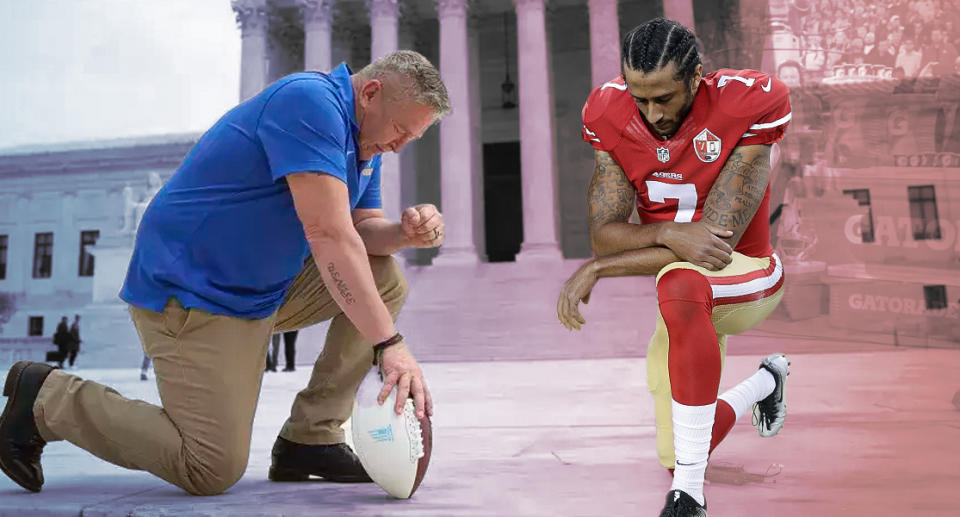The man looks around the football stadium, sees the stands rising above him, feels the grass beneath his feet. This is a special place for him, a place where he feels most in touch with the passions that fuel him, the desires that drive him. The game isn’t taking place right now, but its energy is all around. Overwhelmed by the moment, the man drops to a knee, his mind on something much bigger than himself. It’s a beautiful scene.
Is he kneeling in protest or in prayer? Could be either one. The answer will enrage one swath of Americans and embolden another.
You know the story of Colin Kaepernick, who knelt during the national anthem to protest police brutality in the 2016 NFL season, and subsequently found himself out of a job.
Now, consider the story of Joseph Kennedy, a former assistant football coach at Bremerton High School in Washington state. Kennedy regularly knelt after football games in prayer, and in 2015, he too found himself out of a job.
In both cases, the precipitating event that led to both men’s unemployment was the act of kneeling. NFL teams aren’t obligated to provide a job for a player whose off-field activities cause complications for the team, and public school officials can’t appear to be advocating for one religion over another. Those are foundational facts.
Kennedy filed suit over his dismissal, and in time, Kennedy v. Bremerton School District reached the highest court in the land. On Monday, the United States Supreme Court ruled in a 6-3 decision that Kennedy had been wronged and that the school district had improperly terminated him. Outside of gun control and abortion cases, it was the most closely watched decision of this year’s term, drawing intense interest from free speech and religious rights advocates alike.


“The Constitution and the best of our traditions counsel mutual respect and tolerance, not censorship and suppression, for religious and nonreligious views alike,” Justice Neil Gorsuch wrote for the majority. The case, in effect, hinged on whether Kennedy, a public school employee, was praying as others joined him, or leading others in prayer. There’s a significant difference.
“This Court consistently has recognized that school officials leading prayer is constitutionally impermissible,” Justice Sonia Sotomayor wrote in a dissent. “Official-led prayer strikes at the core of our constitutional protections for the religious liberty of students and their parents.”
The nuances between Kaepernick and Kennedy aren’t exact. Kaepernick knelt during the national anthem, which sparked much of the outrage against him. (Many players and team officials were booed even when they knelt at other times, however, which indicates that at least some of the opposition to protests had nothing to do with their timing.)
Moreover, the issue with Kennedy isn’t that he was kneeling alone, it’s that he eventually began drawing large crowds to kneel with him, which starts to bang up hard against the wall between church and state. And assuming that a high school player would be able to simply opt out of a prayer led by a coach betrays an immense naiveté about the way high school sports hierarchies work.
Beyond the legal implications of the ruling — which are vast, and beyond the scope of this particular column — consider individual reactions to the acts of kneeling. Many of the same conservative outlets hailing Kennedy for espousing his beliefs spent years savaging Kaepernick for espousing his. Many of the same progressive commentators who vocally supported Kaepernick’s right to protest are outraged that Kennedy would bring his beliefs into the workplace.
At the heart of the debate, we have two men, silently expressing their beliefs, both outside the context of a game. That’s why free speech is such a devil — truly believing in it means protecting some speech you don’t like. The stick-to-sports crowd is happy not to stick to sports when, say, prayer is involved. The sports-is-a-reflection-of-society crew doesn’t much appreciate when sports reflects an element of society that’s not their own.
The simplest answer would be for those enraged by either kneeler to stop taking offense at what are — by any rational measure — minor provocations at best. There are far larger, more important battles to be fought.
If Kaepernick — or someone like him, given that he’s not in the league — were to start burning flags in the middle of plays, that would be a different issue. If Kennedy, or the thousands of other high school coaches who already pray before and after games, were to make prayer compulsory to remain on the team, that would also be a very different matter than the simple act of one man kneeling in prayer on a field.
Kaepernick and Kennedy are an opportunity to widen the lens through which we view America in 2022, to look beyond just the triggers that make us see red. Yeah, I know … no one will do this. Still … people can often be intolerable. That doesn’t mean we have to be intolerant to match.
_____
Contact Jay Busbee at jay.busbee@yahoo.com or on Twitter at @jaybusbee.
